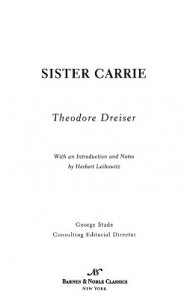Jennie Gerhardt - Драйзер Теодор (книги бесплатно без онлайн .txt) 📗
the people. Born a native of southern Ohio, he had been raised and
educated there, if one might except the two years in which he had studied law at Columbia University. He knew common and criminal law, perhaps,
as well as any citizen of his State, but he had never practised with that assiduity which makes for pre-eminent success at the bar. He had made
money, and had had splendid opportunities to make a great deal more if
he had been willing to stultify his conscience, but that he had never been able to do. And yet his integrity had not been at all times proof against the claims of friendship. Only in the last presidential election he had thrown his support to a man for Governor who, he well knew, had no claim
which strictly honorable conscience could have recognized.
In the same way, he had been guilty of some very questionable, and one
or two actually unsavory, appointments. Whenever his conscience pricked
him too keenly he would endeavour to hearten himself with his pet
phrase, "All in a lifetime." Thinking over things quite alone in his easy-chair, he would sometimes rise up with these words on his lips, and smile sheepishly as he did so. Conscience was not by any means dead in him.
His sympathies, if anything, were keener than ever.
This man, three times Congressman from the district of which Columbus
was a part, and twice United States Senator, had never married. In his
youth he had had a serious love affair, but there was nothing discreditable to him in the fact that it came to nothing. The lady found it inconvenient to wait for him. He was too long in earning a competence upon which
they might subsist.
Tall, straight-shouldered, neither lean nor stout, he was to-day an
imposing figure. Having received his hard knocks and endured his losses,
there was that about him which touched and awakened the sympathies of
the imaginative. People thought him naturally agreeable, and his
senatorial peers looked upon him as not any too heavy mentally, but
personally a fine man.
His presence in Columbus at this particular time was due to the fact that his political fences needed careful repairing. The general election had
weakened his party in the State Legislature. There were enough votes to
re-elect him, but it would require the most careful political manipulation to hold them together. Other men were ambitious. There were a half-dozen available candidates, any one of whom would have rejoiced to step
into his shoes. He realised the exigencies of the occasion. They could not well beat him, he thought; but even if this should happen, surely the
President could be induced to give him a ministry abroad.
Yes, he might be called a successful man, but for all that Senator Brander felt that he had missed something. He had wanted to do so many things.
Here he was, fifty-two years of age, clean, honourable, highly
distinguished, as the world takes it, but single. He could not help looking about him now and then and speculating upon the fact that he had no one
to care for him. His chamber seemed strangely hollow at times—his own
personality exceedingly disagreeable.
"Fifty!" he often thought to himself. "Alone—absolutely alone."
Sitting in his chamber that Saturday afternoon, a rap at his door aroused him. He had been speculating upon the futility of his political energy in the light of the impermanence of life and fame.
"What a great fight we make to sustain ourselves?" he thought. "How little difference it will make to me a few years hence?"
He arose, and opening wide his door, perceived Jennie. She had come, as
she had suggested to her mother, at this time, instead of on Monday, in
order to give a more favourable impression of promptness.
"Come right in," said the Senator; and, as on the first occasion, he graciously made way for her.
Jennie passed in, momentarily expecting some compliment upon the
promptitude with which the washing had been done. The Senator never
noticed it at all.
"Well, my young lady," he said when she had put the bundle down, "how do you find yourself this evening?"
"Very well," replied Jennie. "We thought we'd better bring your clothes to-day instead of Monday."
"Oh, that would not have made any difference," replied Brander lightly.
"Just leave them on the chair."
Jennie, without considering the fact that she had been offered no payment for the service rendered, was about to retire, had not the Senator detained her.
"How is your mother?" he asked pleasantly.
"She's very well," said Jennie simply.
"And your little sister? Is she any better?"
"The doctor thinks so," she replied.
"Sit down," he continued graciously. "I want to talk to you."
Moving to a near-by chair, the young girl seated herself.
"Hem!" he went on, clearing his throat lightly. "What seems to be the matter with her?"
"She has the measles," returned Jennie. "We thought once that she was going to die."
Brander studied her face as she said this, and he thought he saw
something exceedingly pathetic there. The girl's poor clothes and her
wondering admiration for his exalted station in life affected him. It made him feel almost ashamed of the comfort and luxury that surrounded him.
How high up he was in the world, indeed!
"I am glad she is better now," he said kindly. "How old is your father?"
"Fifty-seven."
"And is he any better?"
"Oh yes, sir; he's around now, although he can't go out just yet."
"I believe your mother said he was a glass-blower by trade?"
"Yes, sir."
Brander well knew the depressed local conditions in this branch of
manufacture. It had been part of the political issue in the last campaign.
They must be in a bad way truly.
"Do all of the children go to school?" he inquired.
"Why, yes, sir," returned Jennie, stammering. She was too shamefaced to own that one of the children had been obliged to leave school for the lack of shoes. The utterance of the falsehood troubled her.
He reflected awhile; then realising that he had no good excuse for further detaining her, he arose and came over to her. From his pocket he took a
thin layer of bills, and removing one, handed it to her.
"You take that," he said, "and tell your mother that I said she should use it for whatever she wants."
Jennie accepted the money with mingled feelings; it did not occur to her
to look and see how much it was. The great man was so near her, the
wonderful chamber in which he dwelt so impressive, that she scarcely
realised what she was doing.
"Thank you," she said. "Is there any day you want your washing called for?" she added.
"Oh yes," he answered; "Monday—Monday evenings."
She went away, and in a half reverie he closed the door behind her. The
interest that he felt in these people was unusual. Poverty and beauty
certainly made up an affecting combination. He sat down in his chair and
gave himself over to the pleasant speculations which her coming had
aroused. Why should he not help them?
"I'll find out where they live," he finally resolved.
In the days that followed Jennie regularly came for the clothes. Senator
Brander found himself more and more interested in her, and in time he
managed to remove from her mind that timidity and fear which had made




